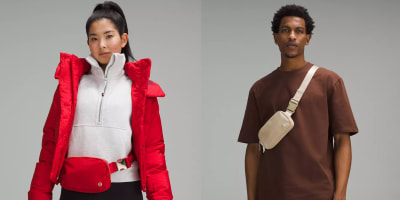The blurred line between Black Friday and Cyber Monday
Our editors independently selected these items because we think you will enjoy them and might like them at these prices. If you purchase something through our links, we may earn a commission. Pricing and availability are accurate as of publish time. Learn more about Shop TODAY.
Black Friday is synonymous with some of the biggest sales to kick off the holiday shopping season, with retailers and shoppers planning for those doorbuster deals after the Thanksgiving leftovers are put away. But until recently, it remained a largely brick-and-mortar phenomenon, said Jessica Young, associate director of research at Digital Commerce 360. In tandem with the online shopping boom of recent decades, Cyber Monday was introduced as a way for e-commerce retailers like Amazon to capitalize on holiday discounts and, in turn, an excuse for retailers to expand their biggest sales events of the year.
In recent years, though, the line between the two has blurred. With more shoppers turning to online shopping, Black Friday and Cyber Monday are no longer limited to in-store or online sales, respectively, as merchants extend in-store Black Friday promotions to their online stores. Retailers aren’t confined to hosting sales on a particular day, either: Some Black Friday deals can start as early as October, while Cyber Monday can extend into “Cyber Week” with additional sales, experts told us.
The main deals, however, occur during what’s popularly known as the “Cyber 5,” which runs from Thanksgiving Day through the Monday after the holiday (some experts consider this five-day period “Cyber Week,” as well). To help you prepare for these major shopping days and make sense of the immense number of sales, we consulted retail experts about the main differences between Black Friday and Cyber Monday — and the types of deals you can score during each one.
Related: How one day dedicated to sales morphed into a month-long promotional season.
Black Friday versus Cyber Monday: What’s the difference?
Black Friday originated to lure shoppers into stores the day after Thanksgiving, which many businesses offer as a paid holiday. Cyber Monday, on the other hand, was coined by the National Retail Federation (NRF) in 2005 and born as the internet’s counterpart: It was an “alternative to the madness” of the large crowds and long lines, and a way for retailers to “prolong demand and urgency beyond just Black Friday, offering additional deals online as people headed back to work,” said Young.
Is one generally better than the other? It depends, experts say. Cyber Monday edges out Black Friday for “the highest overall discounts online,” said Young. It typically hosts the deepest promotions of any other day during Cyber 5 — but only by a small margin. In 2020, the average discount rate started at 28 percent on Thanksgiving Day and grew modestly throughout the week, ending with 29 percent on Cyber Monday, according to Salesforce data.
Cyber Monday’s very appeal lies in the convenience of online shopping, or the ability to add an item to your cart and check out in minutes. But Black Friday has the holiday factor, which experts told us can be easier for those in the workforce who may not have time to dedicate to shopping during work hours.
“Since Cyber Monday occurs during a typical work week rather than a holiday weekend, employees may have to squeeze their shopping around their lunch hours or breaks,” said Carol Kaufman-Scarborough, PhD, professor of marketing at the Rutgers School of Business - Camden.
Still, Cyber Monday typically outperforms Black Friday in terms of sales: Black Friday raked in $9 billion in 2020, while Cyber Monday hit $10.8 billion, making it the largest online shopping day in U.S. history, according to data from Adobe Analytics.
The rise of e-commerce shopping and Covid’s impact
Cyber Monday claims the top spot when it comes to e-commerce spending, but Black Friday is narrowing that gap as it sees an exponential increase in online sales — Black Friday 2020 was the second largest online spending day in U.S. history, according to the Adobe report. NRF data also showed the number of online Black Friday shoppers in 2020 increased by 8 percent from 2019 (passing the 100 million mark for the first time ever). Data shows that the interest in online shopping during Thanksgiving and Black Friday — and the weekend following it — has been trending upward in the past few years.
The large increase of online shopping in 2020 is due in large part to the coronavirus pandemic’s impact on buying behavior.
“Consumers shifted a lot of shopping to the web, skipping holiday weekend store visits entirely or opting for omnichannel services like curbside pickup that limited shoppers’ exposure to others,” Young explained. In fact, curbside pickup on Black Friday 2020 increased 52 percent from 2019, and Young expects these services to remain popular this year as shoppers “have since gotten very comfortable using them.”
That means money usually spent in physical stores on Black Friday were redirected to digital purchases. According to a post-Cyber 5 report from Digital Commerce 360 and Bizrate Insights, nearly a quarter of shoppers said they placed more orders online because they knew that some stores wouldn’t be open or would be restricting shoppers during Black Friday 2020. And this move will likely continue this year as a result of concerns over the Delta variant: Major retailers like Walmart, Target, Best Buy, Kohl’s and Bed Bath & Beyond already announced they’ll be closed for in-person shopping on Thanksgiving this year.
While the shift disrupts Black Friday’s traditionally brick and mortar experience, “it’s proven to be a channel for convenience, value and safety,” said Greg Kelly, a senior partner at McKinsey & Company who leads their marketing and sales practice globally. The e-commerce step change “will hold,” but Kelly said the in-store experience “isn’t going away” anytime soon — retailers still “need to be thinking about what the overall omnichannel experience looks like for its customers,” he added.
Related: Here’s how Cyber Monday became the most profitable day for online shopping in U.S. history.
What should you buy on Black Friday vs Cyber Monday?
According to Kristin McGrath, an editor at RetailMeNot, the categories that dominate on Black Friday and Cyber Monday are almost always the same.
“Tech, home, beauty and clothing reign supreme the entire weekend long,” she said. And according to Adobe Analytics, the main categories that saw the strongest discounts during both Black Friday and Cyber Monday last year were electronics, computers, appliances, sporting goods and toys.
The variation between the sales on these days is minimal, experts told us. “Last year, we saw a few unique Cyber Monday tech deals on Apple Watches and Nintendo Switch gaming bundles to help shoppers keep up their buying stamina,” McGrath said. “But, overall, retailers will almost identically replay their deal playbook on Cyber Monday.”
Retailers do traditionally slash prices on big ticket items like televisions, electronics and appliances on Black Friday, which originated as a way to draw shoppers into stores, as we reported in our history of Black Friday. “Cyber Monday will offer TV deals as well, but many retailers stick to the tradition of Black Friday TV doorbusters and really pump out those deals on Black Friday,” McGrath said.
Meanwhile, some brands and products are practically guaranteed to see discounts on both days, including Apple AirPods, Instant Pot products, Amazon-branded smart home products, Google smart home products and Apple Watches. Beyond the traditional doorbuster deals, “this’ll be a good year to shop Black Friday sales for health and wellness products [and] work/study from home items, as current inventories are saturated from the pandemic and prices can fall up to 50 percent off,” said Vipin Porwal, founder of Smarty.
But shoppers scouting for early deals should keep in mind that retailers’ discount rates — especially over the holidays — have declined in the last year and a half due to the pandemic, according to Young. “With Covid-19 putting a big kink in supply chains and retailers finding it hard to keep inventory stocked, there has been no need to incentivize buying to avoid product surplus at the end of the season,” she said.
The result? Shoppers are already seeing higher price tags this year as “retailers are passing on some of the burden of the rising costs to consumers,” according to Young. She added “manufacturing capacity constraints and closures, logistics challenges like inbound shipment delays and carrier lags, and labor shortages” may contribute to higher prices than usual going into Black Friday and holiday shopping.
When to start shopping for deals
Experts recommended doing your shopping early and not waiting until Cyber Monday to snag a good deal. “If an item is on sale during Black Friday, and the price is good, buy it,” McGrath suggested. “Think of Cyber Monday as a second chance to snag items that sold out during Black Friday sales — because retailers generally repeat their deals, you're limiting yourself if you wait until Cyber Monday.”
And the slightly higher discount rate seen on Cyber Monday probably won’t be enough to justify shoppers taking a gamble by assuming a product will still be available come Monday, according to Young: “It’s a risk in a normal year, but with all of the supply chain issues and inventory shortages that persist as the retail industry navigates the ongoing pandemic, it’s an even more dangerous bet — especially if they’re set on checking off specific items on that gift list.”
In fact, if you're after a good deal, “starting on Black Friday is too late,” McGrath said.
The retail calendar previously deemed Black Friday as the start of the holiday season, but retailers are now offering deals earlier in November and sometimes even toward the end of October — a result of shoppers’ preference for early holiday shopping. The pandemic prompted Black Friday sales to start even earlier as the pivot to online shopping and supply chain and shipping concerns challenged receiving gifts in time for the holidays. “Merchants encouraged early seasonal shopping, and messaging around shipping delays resonated while appealing to consumer anxiety over out-of-stock items seemed to be effective,” said Young.
Many shoppers heeded warnings to avoid missing out on a product and took advantage of retailers that incentivized early online buying with sizable pre-Black Friday discounts. Nearly a quarter of the top 100 online retailers in North America promoted holiday shopping in mid-October 2020, according to data from Digital Commerce 360. And by Nov. 23, 78 percent of the top 50 online retailers offered Black Friday deals up to four days before the actual retail holiday.
Young said this elongated shopping season will likely continue in 2021 as retailers face many of the same challenges as last year, including supply chain issues and shipping delays from carriers. In fact, Digital Commerce 360 shows the push toward Black Friday shopping will stretch even earlier this year: 22 percent of retailers said they’ll start holiday marketing in July/August, 16 percent in September and 23 percent in October.
What deals are worth waiting for?
You’ll commonly see retailers advertising a few "extended" deals and promising "one more day" of sales post-Cyber Monday, but they won’t typically launch brand new deals at that time, according to McGrath. Instead, “you're more likely to find a retailer offering some extra time on a promo code or the roster of deals it launched on Cyber Monday,” which means shoppers shouldn’t hold out for better deals, she added.
However, you can benefit from waiting for Cyber Monday when it comes to fashion.
“Clothing retailers often trot out sitewide promo codes for Cyber Monday,” said McGrath. She added that waiting for Cyber Monday could benefit shoppers looking “for clothing in general, rather than a very specific pair of boots,” for example. And if you’re very flexible about your gift purchases, shopping later in December can also be strategic — “that's when retailers will unload holiday items, games and toys,” she said.
Related: Apple's much-anticipated iPhone 13 models are now available for preorder.
Catch up on the latest from NBC News Shopping guides and recommendations and download the NBC News app for full coverage of the coronavirus outbreak.








